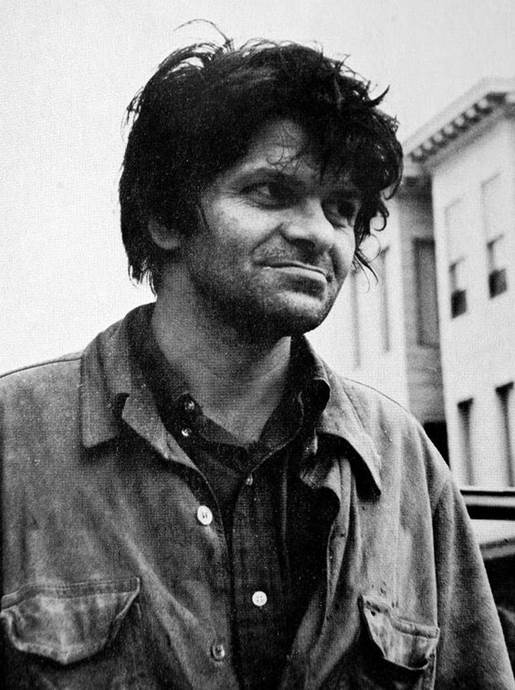1956-2001
New York, NY, USA
Rome, Italy
Nunzio Gregorio Corso (aka Gregory Corso) was an Italian American poet and one of the leading figures of the Beat Generation. The son of Michelina Colonna, a native of Miglionico (a small town in the Matera province) and Fortunato, a first-generation Calabrian American, Corso was born in the Italian section of Greenwich Village in 1930. Due to the troubled relationship between his parents, he spent much of his early life in orphanages and on the streets of the Lower East Side. In his teenage years, he was arrested for a variety of offenses, including drug possession, theft, and breaking and entering. At the age of 17, he was incarcerated for stealing a suit and finally sentenced to two to three years at Clinton State Prison. His socialization with New York City mafia affiliates at Clinton State gained him privileges that allowed him to dedicate most of his serving time to the study of Greek and Roman classics, philosophy, and history (allegedly through the prison’s vast library acquisitions financed by Lucky Luciano just a few years prior).
Shortly after his release, he befriended Allen Ginsberg and Jack Kerouac. His poetry began gaining recognition in the New York City underground literary scene, soon leading to a series of publications by Lawrence Ferlinghetti’s City Lights Publishers (The Vestal Lady on Brattle and Other Poems, 1955; Gasoline, 1958; Bomb, 1958). Corso’s work was not translated into Italian until 1962, when Sergio Perosa rendered the play This Hung-Up Age (1955) in Italian as In quest'epoca inceppata, published by the Milan-based independent press Zero. In 1969, ten years after its publication in the United States, Corso’s most celebrated work, Gasoline (Benzina) was finally translated by Gianni Menarini and published by Guanda Editore (following the press’s 1968 effort to bring Ferlinghetti’s A Coney Island of the Mind to the Italian readership).
Corso first traveled to Italy in 1958, and settled in Rome, where he lived on and off for several years. While in Italy, he wrote some of his most well-known poems, including “Marriage” and “Bomb.” In the following decades, he traveled and performed poetry throughout Italy relentlessly, visiting Torino, Milano, Florence, Venice, Sicily, and settling again in Rome in the mid-80s. In the 1960s, he especially built a rapport with Fernanda Pivano and her Milanese literary circle. In 1966, he published The Geometric Poem (a celebration of Egypt) with Ettore Sottsass’s East 128 press.
Particularly noteworthy are also Corso’s performance at the 1967 Edition of Festival dei Due Mondi (alongside Pablo Neruda, Stephen Spender, Anthony Hecht, Octovio Paz, and Salvatore Quasimodo) and at the 1979 Festival di Castel Porziano (alongside Amiri Baraka, Dario Bellezza, William Burroughs, Diane di Prima, John Giorno, Ferlinghetti, Ginsberg, Brion Gysin, Pivano, Amelia Rosselli, and others).
Over the years, Corso developed a deep and complex relationship with Italy and Italian culture, which is reflected in much of his writing. The bel paese came to represent both Corso’s ancestral quest (in 1997, he would finally reunite with his mother, who, unbeknown to him, had returned to Italy after World War II) and the quest for an “authentic” alternative to what the Beats perceived as a stultifying post-war US cultural landscape. At the same time, in the ruins of the Roman Empire, Corso and other Beats read a cautionary tale for what they believed would be the inevitable fate that an imperialistic nation such as the United States was bound to meet. This double-bind is reflected in a number of Corso’s poems, including “Mutation of the Spirit” (1970), "Ah Roma!” (1990) and in "Gripes & old loves in Rome" (unpublished, 1990). In the latter poem, Corso produces a retrospective on his alienation from Italian culture and social landscape and offers a self-reflexive journey through his past and present experience of Rome.
Upon his death in 2001, Corso was buried in the Non-Catholic Cemetery in Rome, fulfilling his desire to rest by Percy Bysshe Shelley.
Please note: This entry was authored by Stefano Morello and researched collaboratively with the students in Morello’s and Maria Cristina Iuli’s 2022 undergraduate course “L0482 - LETTERATURA NORDAMERICANA II ANNO A 2022/2023” at the University of Eastern Piedmont.
Related Vectors
Ettore Sottsass
architect, designer
Lawrence Ferlinghetti
Poet and Publisher
Festival of the Two Worlds
Festival
Sources
Gregory Corso, "Botticelli's Spring" in Gasoline & Vestal Lady. City Lights, 1958: 34.
Gregory Corso, "I Where I Stand," in Long Live Man. New Directions: 1962.
Gregory Corso, "After Reading 'in the Clearing'," in Long Live Man. New Directions: 1962.
Gregory Corso, "A Poem Begun to See How Good My Head Still is," in Mindfield. Thunder's Mouth, 1989: 31.
Gregory Corso, "On Palatine," in The Happy Birthday of Death. New Directions, 1960: 63.
Gregory Corso, "Saint Francis," in Long Live Man. New Directions: 1962.
"Ah Roma! – Corso & Kuipers," in The Allen Ginsberg Project, July 9, 2012.
"Gripes & old loves in Rome" (1990)


